The Development of Ecospirituality Among British Quakers
DOI:
https://doi.org/10.37536/ECOZONA.2011.2.2.420Abstract
This paper focuses on the historical development of ecospirituality, that is, a faith and practice both generating and informed by an appreciation of environmental concerns, among the Religious Society of Friends (Quakers) in Britain. Decisions made within and by such groups are significantly determined by their understanding of the moral and ethical character of the environment and their relation to it. This ethical and moral character might derive from a variety of sources; in contemporary concerns for the environment it resides primarily in the cultural, economic, and political context of particular social phenomena. Quakers, it would seem, are more or less typical environmentalists in so far as their decision either to buy or refrain from buying this or that item is informed by both moral and religious judgement. The historical trajectory of Quaker consumption is characterised by a principle, plaining, that has enabled Quakers to frame their environmentalism in a more or less unique way. During the first hundred years of the movement (1650-1750), Quakers adopted a system of discipline in which committees (local, regional, and national) imposed upon the membership a strict regime of prescriptions and proscriptions. These lists of dos and don’ts, justified by reference to Biblical and other texts, concerned virtually every aspect of life, and these decisions were informed by specific environmental sensibilities central to Quaker faith and practice. From 1750 to 1950, this intense and intrusive discipline, upheld through group-surveillance, diminished. After 1950, the evolution of the group from a discipline which itemised the plain to the internalisation of individual members of the process of plaining was more or less complete. Discipline was increasingly a matter of self-surveillance. Contemporary Quakers emphasise efficient and effective dissemination of information, particularly relating to issues such as human rights and the environment. This process contributes to the local and national narratives which together sustain a kind of ecospirituality which has developed over the course of three centuries.
Este artículo analiza el desarrollo histórico de la eco-espiritualidad, una fe y una práctica generadora y resultante de una percepción de los problemas medioambientales entre la Sociedad Religiosa de los Amigos (cuáqueros) en Gran Bretaña. Las decisiones tomadas por y dentro de estos grupos están significativamente determinadas por su compresión del carácter moral y ético del medioambiente y por su relación con el mismo; en cuanto a las inquietudes ecologistas contemporáneas residen fundamentalmente en el contexto cultural, económico y político de determinados fenómenos sociales. Parecería que los cuáqueros serían más o menos ecologistas típicos en función de si su decisión de comprar algo o abstenerse de hacerlo es resultante de juicios morales y religiosos. La trayectoria histórica del consumo de los cuáqueros está caracterizada por un lema, la "sencillez" (plaining), que los ha incapacitado para encuadrar su ecologismo en una vía más o menos única. Durante el primer siglo de vida del movimiento (1650-1750), los cuáqueros adoptaron un sistema disciplinario en el que comités locales, regionales y nacionales impusieron un estricto régimen de prescripciones y prohibiciones entre sus miembros. Dicho régimen, justificado por referencias a textos bíblicos y de otra índole, afectaba a cada aspecto de su existencia y se fundamentó en la específica sensibilidad ecológica de la fe y la práctica cuáqueras. De 1750 a 1950 esta intensa y molesta disciplina, sustentada en la vigilancia grupal, disminuyó. De modo que podemos considerar que la evolución del grupo desde una disciplina que desglosaba el plan hasta la internacionalización de miembros individuales de la "sencillez" (plaining) estaba más o menos realizada en 1950. La disciplina fue pues convirtiéndose progresivamente en una cuestión de auto-vigilancia. Los cuáqueros contemporáneos destacan por su diseminación eficiente y efectiva de información, particularmente relacionada con aspectos como los derechos humanos y el medioambiente. Este proceso contribuye a sus narrativas locales y nacionales que juntas sostienen un tipo de eco-espiritualidad que se ha desarrollado a lo largo de tres siglos.
Descriptores: Eco-espiritualidad; Ecologismo; Cuaquerismo; Plaining.
Downloads
##submission.downloads##
Pubblicato
Fascicolo
Sezione
Licenza
Authors who publish with this journal agree to the following terms:
a) Authors retain copyright and grant the journal right of first publication with the work simultaneously licensed under a Creative Commons Attribution License that allows others to share the work with an acknowledgement of the work's authorship and initial publication in this journal (CC BY-NC for articles and CC BY-NC-ND for creative work, unless author requests otherwise.
b) Authors are able to enter into separate, additional contractual arrangements for the non-exclusive distribution of the journal's published version of the work (e.g., post it to an institutional repository or publish it in a book), with an acknowledgement of its initial publication in this journal.
c) Authors are permitted and encouraged to post their work online (e.g., in institutional repositories or on their website) prior to and during the submission process, as it can lead to productive exchanges, as well as earlier and greater citation of published work (See The Effect of Open Access).










